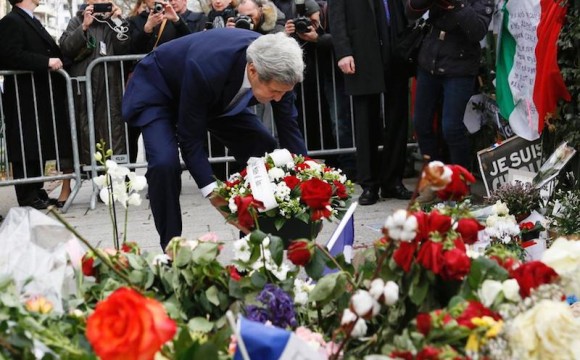
Ten days after the assassination at the Charlie Hebdo office including the magazine’s editor and leading cartoonists, France is on high alert. Threats against persons and acts of vandalism are multiplying. The Jewish community is scared, the Muslims feel stigmatized, the Catholics are worried. It would be exaggerated however to describe – the way a Fox News journalist claimed – that certain areas of Paris, such as the 11th arrondissement, are dangerous and should be avoided. Incidentally, the journalist quickly withdrew his remark.
Prime minister Manuel Valls and minister of the Interior Bernard Caseneuve have launched maximum security measures: the Vigipirate alert system (at first created by president Giscard d’Estaing in 1978) now includes 10,000 troops from the Foreign Legion, the army and the police. They are positioned throughout France to protect monuments, schools and places of worship, as well as strategic points like airports or railroad stations. On Thursday, Francois Hollande was on the air force carrier Charles de Gaulle in Toulon to review the 2,000 troops before their departure for manoeuvers in the Indian Ocean. France has currently nine Rafales in Jordan and two Mirages in Saudi Arabia.
The criminal investigation has been fast and efficient. In lightning speed, they uncovered more ramifications of the jihadists’ organization, extended to their families, friends and acquaintances, with the “Buttes-Chaumont connection” at the center. The Belhoucine brothers are on the list of suspects. A large number of individuals have been taken for questioning and nine are currently in police custody . In the Paris region, five caches of weapons have been located and searched.
Reinforcement of the legal system to control the jihadists’ travels and activities is being studied by the government. Measures such as the creation of special files on terrorists similar to the ones kept on sexual offenders and withdrawing the French nationality of returning jihadists are being considered. Voting on a new law should take place as early as the beginning of February. Control of internet has become a priority. The social networks constitute a counter culture expressed in simple manichean terms to be accessible to the largest possible numbers. Calls for violence and hatred never stop.
The recent events have marked the French. On Wednesday, January 14, after a powerful speech by the prime minister at the National Assembly, all the deputies stood up to observe a minute of silence. Then one voice started singing the Marseillaise and soon everybody followed in unison. The last time this happened was on November 11, 1918! At the Institut du Monde Arabe and during all the official ceremonies, the president and the prime minister reiterated their basic point: the French government is not against Islam nor the Muslim population. Around the world, French diplomatic representations and economic interests are under attack. The TV news shows the fury of violent mobs shouting their hatred in the streets of Niger — quite a contrast from the calm of the people in the streets of Paris on January 11.
Laicite (secularism) is a specificity of France, and the outcome of a tumultuous history, starting with the 16th century wars of religions, opposing monarch and church. It took a whole century for the Catholic Church to accept the separation of church and state in 1904. That principle was enshrined in the first article of the 1958 constitution at the outset of the fifth Republic. It is alien to most of the other countries and should be “formatted” (to use a computer science term) in order to be understood beyond our borders.
US Secretary of State John Kerry paid a visit to Paris, saw the places where the violent attacks took place on January 7 and used warm words (in French) to express his support of France.

About the author: Nicole Prévost Logan divides her time between Essex and Paris, spending summers in the former and winters in the latter. She writes a regular column for us from her Paris home where her topics will include politics, economy, social unrest — mostly in France — but also in other European countries. She also covers a variety of art exhibits and the performing arts in Europe. Logan is the author of ‘Forever on the Road: A Franco-American Family’s Thirty Years in the Foreign Service,’ an autobiography of her life as the wife of an overseas diplomat, who lived in 10 foreign countries on three continents. Her experiences during her foreign service life included being in Lebanon when civil war erupted, excavating a medieval city in Moscow and spending a week under house arrest in Guinea.